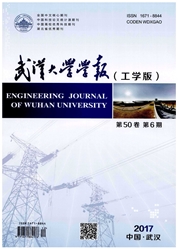

 中文摘要:
中文摘要:
基于子集模拟提出了一种高效的浅基础扩展可靠度设计方法,极大地提高了扩展可靠度设计方法在小概率区域的设计效率,并系统推导了相关的计算公式.为了便于子集模拟在扩展可靠度设计中的应用,构建了一个代理响应量,用来定义子集模拟中的关键参数——驱动变量.同时,为了促进该方法的应用,解决工程师对可靠度分析算法不熟悉的实际困难,本方法以EXCEL的表单环境为计算平台,联合运用Visual Basic Application编写设计程序和用户界面.最后,以一个浅基础设计算例,说明了所提方法及所开发的计算程序的准确性和有效性,并系统地探讨了子集模拟中驱动变量对浅基础可靠度设计的影响,证明了在扩展可靠度设计中采用所构建的代理系统响应量定义的驱动变量相对于传统驱动变量的优势.
 英文摘要:
英文摘要:
This paper aims to develop an efficient reliability-based design (RBD) approach for geotechnical engineering structures, in which an advanced Monte Carlo simulation (MCS) method called subset simula- tion (SS) is used to calculate the failure probabilities of all the possible designs in design space by a single run of simulation. To facilitate the application of SS in RBD, a generalized surrogate response is proposed. Equations are derived and implemented in a commonly-available spreadsheet environment to effectively re- move the hurdle of reliability computational algorithm and to make the proposed approach available to geotechnical practitioners. The proposed approach is illustrated through a shallow foundation design exam- ple. It is shown that the proposed approach provides results that are consistent with those from previous studies and significantly improves the efficiency and resolution at small probability levels compared with di- rect MCS, making the proposed approach feasible in the design situations with a small target failure proba- bility. In addition, effects of the choice of driving variable (one key parameter in SS) in SS for RBD are al- so systemically explored; and the advantages of the driving variable defined using the proposed surrogate response over the conventional definition of driving variable in expanded RBD are demonstrated.
 同期刊论文项目
同期刊论文项目
 同项目期刊论文
同项目期刊论文
 期刊信息
期刊信息
